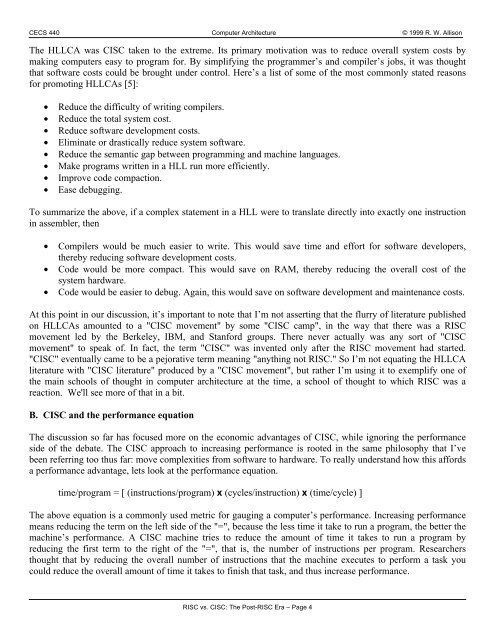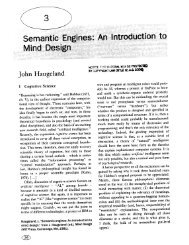RISC vs. CISC
RISC vs. CISC
RISC vs. CISC
Create successful ePaper yourself
Turn your PDF publications into a flip-book with our unique Google optimized e-Paper software.
CECS 440 Computer Architecture © 1999 R. W. Allison<br />
The HLLCA was <strong>CISC</strong> taken to the extreme. Its primary motivation was to reduce overall system costs by<br />
making computers easy to program for. By simplifying the programmer’s and compiler’s jobs, it was thought<br />
that software costs could be brought under control. Here’s a list of some of the most commonly stated reasons<br />
for promoting HLLCAs [5]:<br />
• Reduce the difficulty of writing compilers.<br />
• Reduce the total system cost.<br />
• Reduce software development costs.<br />
• Eliminate or drastically reduce system software.<br />
• Reduce the semantic gap between programming and machine languages.<br />
• Make programs written in a HLL run more efficiently.<br />
• Improve code compaction.<br />
• Ease debugging.<br />
To summarize the above, if a complex statement in a HLL were to translate directly into exactly one instruction<br />
in assembler, then<br />
• Compilers would be much easier to write. This would save time and effort for software developers,<br />
thereby reducing software development costs.<br />
• Code would be more compact. This would save on RAM, thereby reducing the overall cost of the<br />
system hardware.<br />
• Code would be easier to debug. Again, this would save on software development and maintenance costs.<br />
At this point in our discussion, it’s important to note that I’m not asserting that the flurry of literature published<br />
on HLLCAs amounted to a "<strong>CISC</strong> movement" by some "<strong>CISC</strong> camp", in the way that there was a <strong>RISC</strong><br />
movement led by the Berkeley, IBM, and Stanford groups. There never actually was any sort of "<strong>CISC</strong><br />
movement" to speak of. In fact, the term "<strong>CISC</strong>" was invented only after the <strong>RISC</strong> movement had started.<br />
"<strong>CISC</strong>" eventually came to be a pejorative term meaning "anything not <strong>RISC</strong>." So I’m not equating the HLLCA<br />
literature with "<strong>CISC</strong> literature" produced by a "<strong>CISC</strong> movement", but rather I’m using it to exemplify one of<br />
the main schools of thought in computer architecture at the time, a school of thought to which <strong>RISC</strong> was a<br />
reaction. We'll see more of that in a bit.<br />
B. <strong>CISC</strong> and the performance equation<br />
The discussion so far has focused more on the economic advantages of <strong>CISC</strong>, while ignoring the performance<br />
side of the debate. The <strong>CISC</strong> approach to increasing performance is rooted in the same philosophy that I’ve<br />
been referring too thus far: move complexities from software to hardware. To really understand how this affords<br />
a performance advantage, lets look at the performance equation.<br />
time/program = [ (instructions/program) x (cycles/instruction) x (time/cycle) ]<br />
The above equation is a commonly used metric for gauging a computer’s performance. Increasing performance<br />
means reducing the term on the left side of the "=", because the less time it take to run a program, the better the<br />
machine’s performance. A <strong>CISC</strong> machine tries to reduce the amount of time it takes to run a program by<br />
reducing the first term to the right of the "=", that is, the number of instructions per program. Researchers<br />
thought that by reducing the overall number of instructions that the machine executes to perform a task you<br />
could reduce the overall amount of time it takes to finish that task, and thus increase performance.<br />
<strong>RISC</strong> <strong>vs</strong>. <strong>CISC</strong>: The Post-<strong>RISC</strong> Era – Page 4











